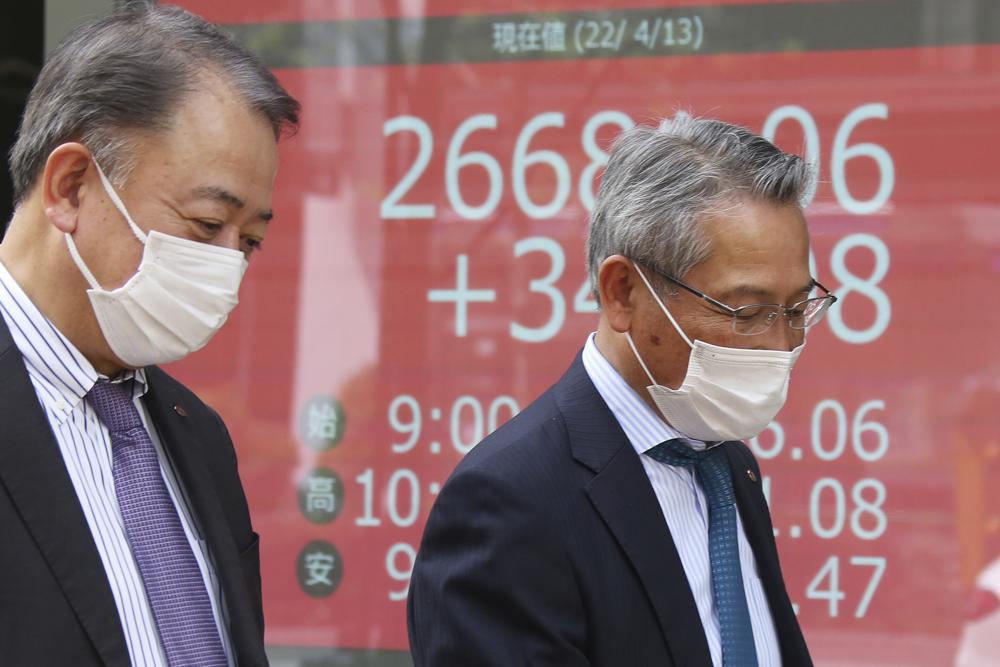

Asian shares were mostly higher Wednesday after new data showed inflation in the U.S., while still at a 40-year high, was not as bad as some analysts had expected.
Benchmarks rose in Japan, South Korea, Hong Kong and Australia. U.S. futures were also higher, while oil prices were little changed.
Shares fell in Shanghai after the Chinese government reported that exports rose nearly 16% in March from a year earlier while imports were flat.
The easing of a COVID-19 lockdown in Shanghai was another encouraging factor. Shanghai released 6,000 more people from the central facilities where they were under medical observation to guard against the coronavirus, the government said Wednesday, though the lockdown of most of China’s largest city was being maintained in its third week.
But Bennett added: “Do not expect a return to rampant growth, however.”
Japan’s benchmark Nikkei 225 jumped 1.9% to finish at 26,843.49. Australia’s S&P/AS 200 added 0.3% to 7,479.00. South Korea’s Kospi surged 1.9% to 2,716.60. Hong Kong’s Hang Seng gained 0.3% to 21,382.96, while the Shanghai Composite shed 0.6% to 3,194.92.
In Tokyo trading, shares of Shionogi dropped 11% after the Japanese pharmaceutical company reported that animal tests for its experimental oral drug to treat COVID-19 showed it may be a risk for fetal development. Japanese media reported the drug won’t be prescribed to pregnant people or those who may be pregnant.
Stocks ended slightly lower on Wall Street on Tuesday after investors weighed the inflation data for March, although overall it remained at its highest level in 40 years. Some analysts urged caution.
“”The fact remains that pricing pressures are still elevated at their highest level in 40 years and the near-term outlook for an aggressive tightening of policies to cool demand stays unaltered,” said Yeap Jun Rong, market strategist at IG in Singapore.
The S&P 500 fell 0.3% after having been up 1.3% earlier in the day. The pullback extends the benchmark index’s losing streak to a third day, reflecting investors’ worries about the potential economic collateral damage as the Federal Reserve tackles high inflation more aggressively.
The Dow Jones Industrial Average and the Nasdaq composite each fell 0.3% after shedding early gains.
The indexes initially rallied following the release of the report, which showed inflation last month was again at its highest level in generations, driven by soaring gasoline prices in particular. Still, the reading was relatively close to economists’ expectations.
The measure known as “core inflation,” which excludes highly volatile costs of food and fuel, moderated to its slowest month-on-month change since September.
In energy trading, benchmark U.S. crude added 10 cents to $100.70 a barrel. It climbed 6.7% to settle at $100.60 on Tuesday, keeping the pressure on inflation. Brent crude, the international standard, rose 25 cents to $104.89.
Consumer prices rose 8.5% in March from a year earlier, accelerating from February’s 7.9% inflation rate and the highest since 1981. To bring it under control, the Fed revealed in the minutes from its latest meeting that it’s prepared to hike short-term rates by half a percentage point, double the usual amount, at some upcoming meetings, something it hasn’t done since 2000.
The worry is the Federal Reserve may be so aggressive about hiking interest rates that it forces the economy into a recession. Higher interest rates can discourage all kinds of investments.
More swings may be in store for stocks as companies prepare to report their earnings for the first three months of the year. Delta Air Lines, JPMorgan Chase and other big-name companies will kick off the reporting season on Wednesday.
In currency trading, the U.S. dollar edged up to 126.03 Japanese yen from 125.37 yen, The euro cost $1.0835, up from $1.0827.